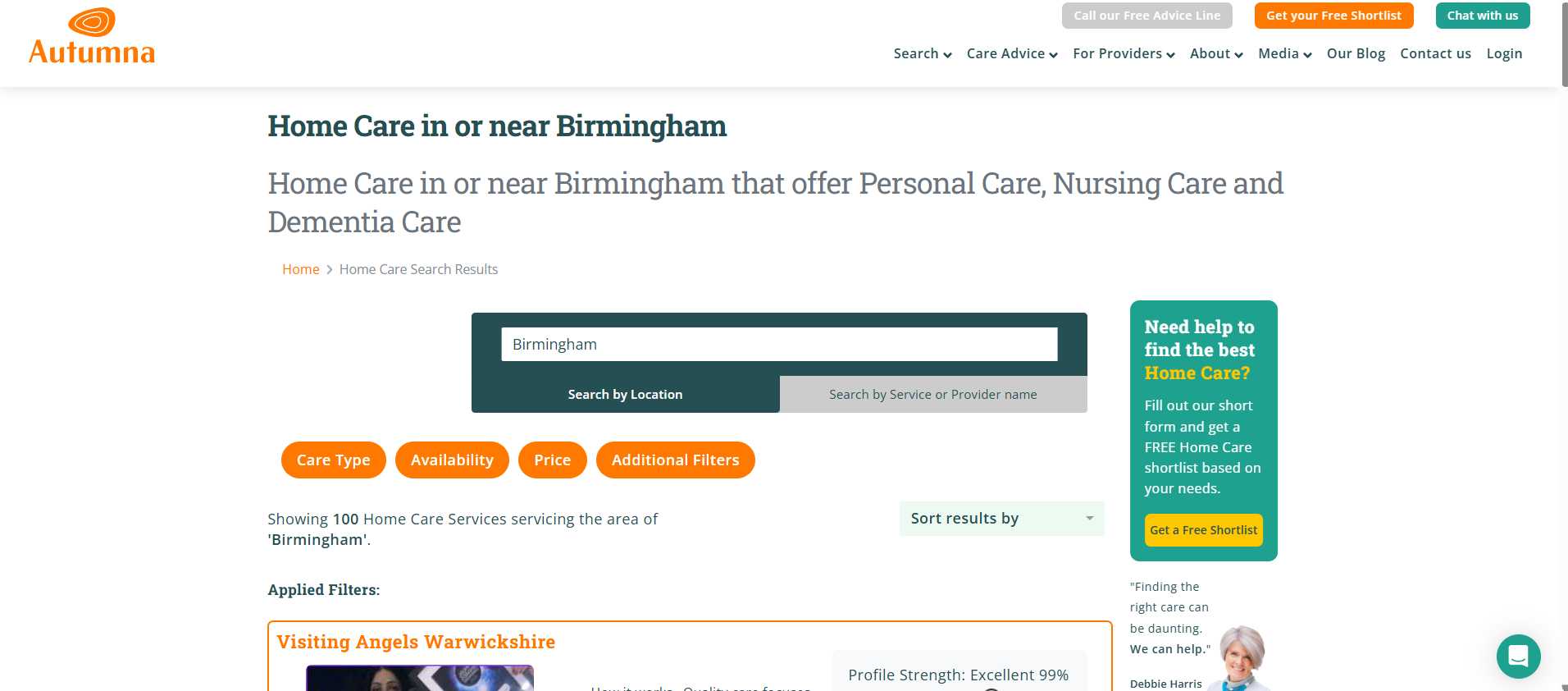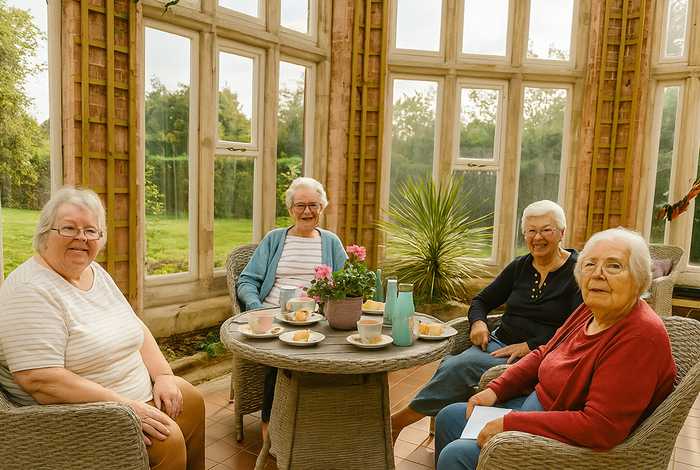Posted by Janine Griffiths
What are the benefits of home care?

Most care doesn’t happen in hospitals or care homes. It happens quietly, behind front doors, in living rooms filled with the scent of familiar furniture and the hum of a normal day.
Home care isn’t just a service it’s the invisible scaffolding that helps thousands of older adults stay independent, safe, and supported in the place they know best. It doesn’t make headlines. It doesn’t demand drastic change. But it works - quietly, consistently, and on a person’s own terms.
So what exactly makes home care such a compelling choice? Why are more families turning to it as a long-term solution or even a stepping stone during recovery? In this blog, we explore the benefits of home care: not just the practical ones, but the deeply human ones, too.
Top benefits of home care
Home care offers more than just practical support, it provides a way to stay independent, comfortable, and in control. Whether you're looking for peace of mind, help with daily tasks, or simply the chance to remain in familiar surroundings, the benefits of home care are wide-ranging. Below are some of the key reasons more people are choosing care that comes to them.
Staying in a familiar environment
One of the most meaningful benefits of home care is the ability to remain in a familiar environment. For many older adults, home isn’t just a place, it’s a grounding force that supports mental health, preserves identity, and offers emotional stability. Familiar surroundings, daily routines, and the freedom to continue living life on one’s own terms all contribute to a stronger sense of wellbeing.
Research consistently shows that staying at home can have a measurable impact on emotional and psychological health. A study published in The Gerontologist found that older adults who receive care at home report better emotional wellbeing and lower rates of depression compared to those in institutional settings. Another study in Aging & Mental Health noted that maintaining a familiar living environment with support can reduce anxiety and promote feelings of safety and control among older adults.
This sense of stability is especially important for individuals living with dementia. Sudden changes in routine or environment can increase confusion and distress, while remaining at home, surrounded by familiar furniture, objects, and cues, can help maintain orientation and reduce agitation.
Staying at home also supports autonomy. The ability to choose when to wake up, what to eat, or simply how to spend the afternoon plays a vital role in helping people retain a sense of control over their own lives something that becomes even more important with age. Home care offers support without replacing the familiar patterns that help people feel like themselves.
Personalised and flexible support
One of the most appreciated benefits of home care is how tailored it can be. Unlike many residential care options, which often rely on fixed routines and shared timetables, home care fits around the individual, not the other way around. It’s care on your terms, shaped by your preferences, your pace, and your priorities.
At home, support doesn’t have to follow a set script. It can be as light or as involved as you need it to be. Maybe it starts with a little help around the house or company on a short walk. Over time, if your needs change, so can the level of support. There’s no sudden shift, no need to adapt to a new environment or unfamiliar faces. Instead, care gently grows with you, always focused on what you want and when you want it.
That flexibility gives people a greater sense of autonomy. You decide when to have your breakfast, whether today is a chatty day or a quiet one, and how your routine flows. You stay in control, not only of your environment, but of your care itself. That kind of choice matters. It keeps care personal, respectful, and much more likely to fit into the life you want to live, not take over from it.
Companionship and continuity
Among the many benefits of home care, the emotional impact can be one of the most meaningful. Loneliness is a growing concern for older adults, particularly for those who live alone or are no longer able to get out and about as easily as they once did. Home care can help bridge that gap, not just with practical support, but with friendly, familiar faces who become part of the rhythm of your week.
Having regular visits from carers you know and trust creates more than just routine. It builds connection. Conversations become easier, and relationships begin to form. This consistency provides reassurance, a sense of being seen and heard, and the comfort of not facing each day entirely alone.
Continuity also supports better care. When the same carer or small team visits regularly, they get to know your preferences, habits, and what feels right for you. This familiarity builds trust and allows care to be more intuitive, responsive, and genuinely personal.
Family involvement and peace of mind
Home care also keeps families connected, informed, and reassured. Even if loved ones live far away or can’t visit often, they can still feel part of the picture. With regular updates, clear communication, and a team that understands the importance of family input, home care makes it easier to stay involved without feeling overwhelmed.
For many families, just knowing that someone is checking in and helping with meals, medication, or simply having a chat can ease a huge amount of worry. It means you're not navigating things alone, and neither is your family.
Home care works best when it’s a partnership. Carers bring professional experience, families bring deep knowledge of the person they love, and together, they create a care approach that feels thoughtful, joined-up, and supportive from every angle.
Cost-effective for many needs
When considering the benefits of home care, cost is naturally part of the conversation. While it’s not always cheaper than other types of care, it can be much more cost-efficient, particularly if you don’t need round-the-clock support. You pay only for the help you use, whether that’s a few visits a week or more regular daily care.
That flexibility allows you to shape care around your actual needs, rather than fitting into a one-size-fits-all solution. It also means you can gradually adjust the level of support as things change, rather than making a big financial and lifestyle leap all at once.
In some cases, financial help may be available through local authorities or other funding routes. While the process can be complex, understanding what’s available and getting guidance early on can make a real difference.
Building strength, staying connected
Some of the most powerful benefits of home care appear during times of change-when someone is recovering from illness, regaining confidence after a hospital stay, or adjusting to a new diagnosis. In these moments, having the right support at home can make all the difference between a smooth recovery and a setback that leads to long-term care.
Supporting recovery and independence
Home care can play a vital role in the early stages of recovery, particularly after hospital discharge. Many people don’t need full-time residential care after a hospital stay, they just need a bit of help to get back on their feet. This is where short-term, flexible support at home becomes incredibly effective, especially in the context of the NHS’s Discharge to Assess (D2A) approach, which encourages recovery in familiar surroundings.
Temporary care at home not only supports physical healing but can also boost emotional resilience. A little help with personal care, meals, or medication routines often gives people the breathing space to focus on getting well. Crucially, this kind of targeted support can reduce the risk of readmission and help prevent small setbacks from becoming bigger health challenges.
One of the long-term benefits of home care is how it supports independence. Home-based rehabilitation and reablement services are designed to build strength and confidence. Instead of removing control, the right care helps people regain it, which makes everyday tasks feel achievable again, and encourages steady, supported progress.
Seamless integration with other services
In today’s world, home care doesn’t exist in isolation. One of the increasingly important benefits of home care is how smoothly it can work alongside other professionals, such as district nurses, physiotherapists, occupational therapists, GPs and social workers to provide joined-up, coordinated support.
When care is integrated like this, everything becomes easier. There’s less stress on families to chase updates or manage appointments. Everyone involved knows what’s happening, and the person receiving care gets a consistent, well-informed experience. It also means care can be adapted more quickly if needs change.
Modern home care often includes tech-enabled support too. Tools like digital medication reminders, falls detection sensors or wellbeing check-ins can add an extra layer of safety and peace of mind, without being intrusive. It’s about blending traditional care with modern solutions-giving those receiving care and their families more confidence and more control.
Respecting dignity and choice
For many, the greatest benefit of home care is the simple fact that it happens on their terms.
Home care preserves a sense of identity and personal agency that can sometimes be lost in more structured settings. It allows older adults to continue living in a way that reflects their preferences and values. Whether it’s sticking to a familiar routine, choosing a preferred carer, or simply having more privacy, the home environment naturally supports a sense of self.
Being treated as an individual rather than just a patient or a task list is at the heart of good care. And when care is respectful and responsive, it often leads to better emotional wellbeing. It’s not just about what help is given, but how it’s given. That’s what makes home care not only practical, but deeply human.
Why home care can help you live on your terms
Home care is uniquely positioned to provide care that adapts to the person receiving it, not the other way around, allowing them to stay in familiar surroundings, remain connected with loved ones, and live life on their terms.
Whether you're recovering from an illness, managing long-term health conditions, or simply looking for the peace of mind that comes with knowing you're supported, home care provides a solution that respects your needs and enhances your quality of life.
Looking for a home care provider?
Searching for home care on Autumna is easy. Just visit the homepage and select Home Care above the search bar on our website. Type in your location and press enter. You will then see a list of providers on our website.

You can also use our shortlisting tool and answer a few questions to receive an even more personalised list of providers. We are also available on 01892 335 330.
Receive a Free Home Care Shortlist!
Let our expert team of advisers get your search off to a great start.
Tell us a little about your needs and we'll send you a bespoke shortlist of home care providers! Click the button below to begin, it takes just a few minutes.
Other articles to read
From the blog

Older Persons Care Advice
How to find a live in carer
October 15th, 2025
Discover how to find a live in carer who’s skilled, trustworthy and compatible, with practical tips on choosing the right support for your needs.

Older Persons Care Advice
Top day centres for the elderly in Kent
October 10th, 2025
Discover top day centres for the elderly in Kent offering companionship, activities, and flexible support to help loved ones stay active and fulfilled.

Older Persons Care Advice
Guide to retirement homes in Surrey
October 7th, 2025
Discover the best retirement homes in Surrey. Explore luxury living, wellness facilities, and supportive communities for a fulfilling later life.
Frequently Asked Questions
Home carers can support you with personal care, meals, medication, companionship, housekeeping, and more-depending on your needs.
No, home care can be as light-touch as you need. It’s also ideal for those wanting help with everyday tasks, recovery support, or simple companionship.
Look for providers listed on trusted directories like Autumna, which show inspection ratings, staff details, and client reviews to help you make an informed choice.
In some cases, yes. Depending on your circumstances, you might qualify for local authority funding or other financial support. It’s worth speaking to an expert.






